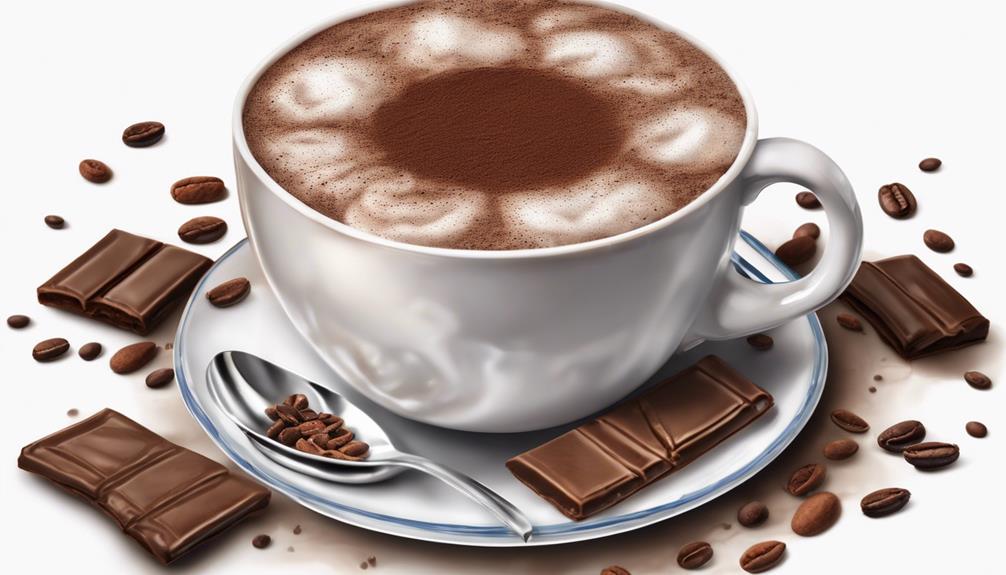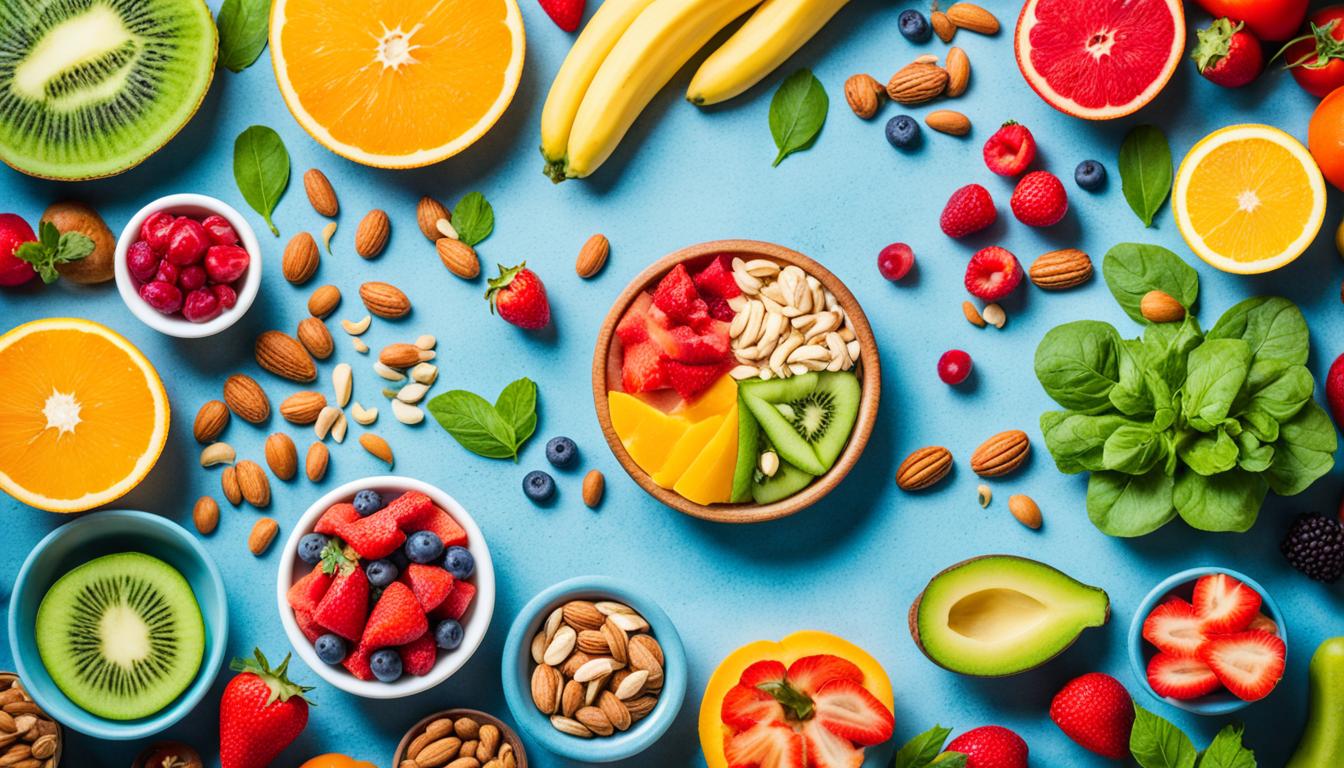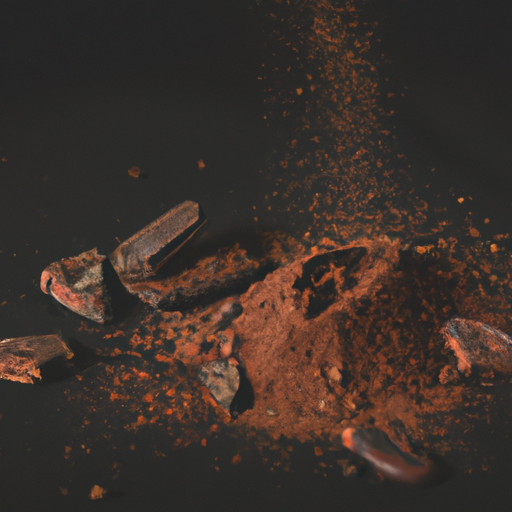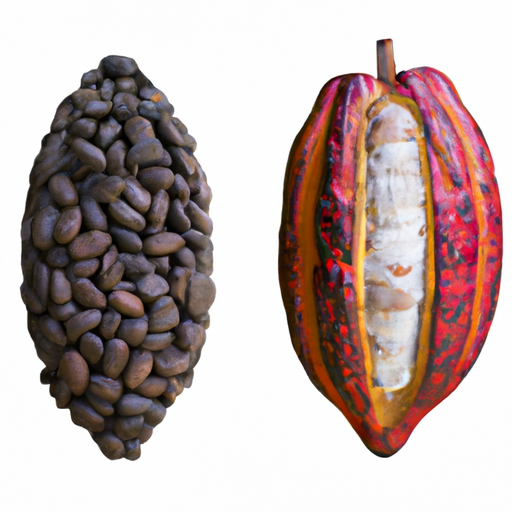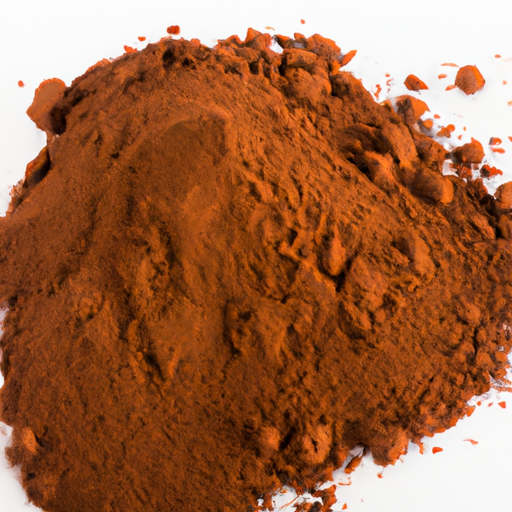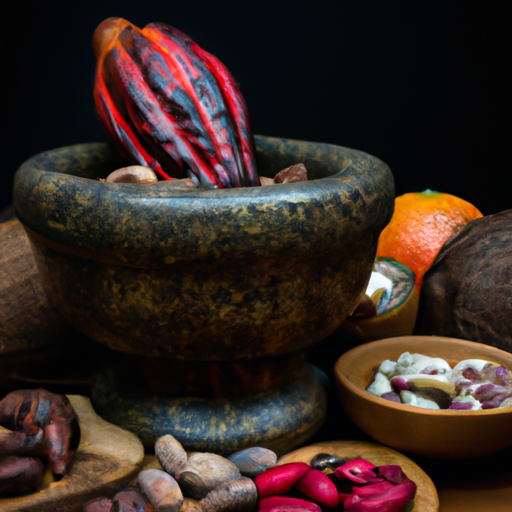Yes, cocoa powder does contain caffeine, specifically 230 mg per 100 grams. Understanding the caffeine content in cocoa powder is crucial for managing your daily intake of this stimulant effectively. It can vary depending on processing methods and types of cocoa beans used, so being aware of it helps you make healthier dietary choices. Opting for decaffeinated cocoa powder, which can reduce caffeine content by 80.1%, enables you to enjoy the nutritional benefits of cocoa without the caffeine effects. This information can assist you in making informed decisions when using this popular ingredient in different recipes.
Key Takeaways
- Cocoa powder contains 230 mg of caffeine per 100 grams.
- Decaffeinated cocoa powder reduces caffeine content by 80.1%.
- Enjoy cocoa benefits without caffeine stimulation with decaffeinated cocoa powder.
- Theobromine and polyphenols are retained in decaffeinated cocoa powder.
- Understanding cocoa caffeine content aids informed dietary choices.
Caffeine Content in Cocoa Powder
When evaluating the caffeine content in cocoa powder, sensitivity levels play an essential role in consumption decisions. Cocoa naturally contains caffeine, with 100g of unsweetened cocoa powder containing around 230mg of caffeine.
However, for individuals sensitive to caffeine's effects, decaffeinated cocoa powder is available. Through a specialized process, decaffeinated cocoa powder can reduce caffeine levels by approximately 80.1%, making it a suitable option for those looking to limit their caffeine intake.
Despite the caffeine removal, decaffeinated cocoa powder retains essential functional components such as polyphenols and theobromine, which offer various health benefits. It's possible to enjoy cocoa products with reduced caffeine content while still obtaining the advantages of these valuable compounds.
When choosing between regular cocoa powder and decaffeinated options, considering personal caffeine sensitivity and health preferences can guide you towards the most suitable choice for your enjoyment and well-being.
Comparing Cocoa and Coffee Caffeine Levels
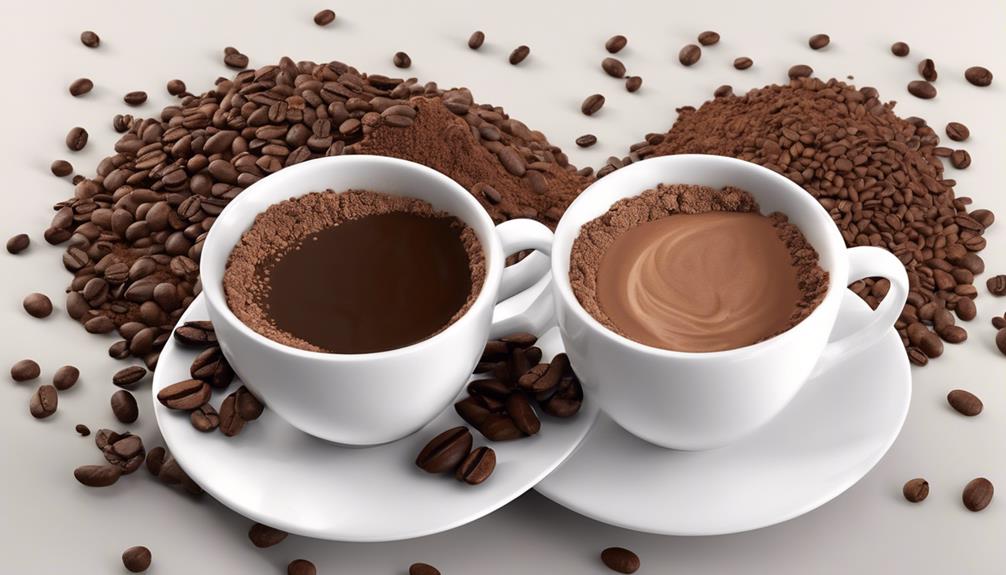
When comparing cocoa and coffee for their caffeine levels, it's crucial to note that cocoa powder contains around 230 mg of caffeine in 3.5 oz.
While an 8 oz cup of regular brewed coffee typically has 95-165 mg of caffeine.
Decaffeinated coffee, in contrast, only contains about 1-5 mg of caffeine per 8 oz cup.
Cocoa Vs Coffee
Comparing the caffeine levels between cocoa and coffee reveals significant differences in their stimulant content. While 3.5 oz of unsweetened cocoa powder contains 230 mg of caffeine, a standard 8 oz cup of coffee can range from 95-165 mg depending on the brewing method and source. Decaf coffee, on the other hand, typically only contains 1-5 mg per cup. Both cocoa and coffee offer unique health benefits; cocoa is rich in flavanols known for their health benefits, while coffee is valued for providing energy and alertness. Moderation is key, as excessive consumption of caffeine from either source can lead to side effects like anxiety and headaches.
| Cocoa Powder | Coffee | |
|---|---|---|
| Caffeine Content | 230 mg | 95-165 mg |
| Health Benefits | Rich in flavanols for health benefits | Provides energy and alertness |
| Decaf Option | No | Yes (1-5 mg) |
Caffeine Content Comparison
Moving from the discussion on Cocoa Vs Coffee, it's evident that a notable disparity exists in the caffeine content when comparing cocoa powder and coffee. When considering caffeine intake, here's how cocoa powder and coffee stack up:
- Cocoa Beans: Cocoa powder contains 230 mg of caffeine per 100 grams, considerably higher than regular brewed coffee with 95-165 mg per 8 oz cup.
- Hot Cocoa: Decaffeinated coffee has 1-5 mg of caffeine per 8 oz cup, much lower than cocoa powder.
- Caffeine Comparison: Cocoa powder offers a concentrated dose of caffeine compared to milk chocolate and espresso shots, making it a potent choice for those seeking a caffeine boost.
Impact of Caffeine in Hot Chocolate
When savoring a mug of hot chocolate, it's crucial to take into account the caffeine content, which can vary depending on the brand and how it's prepared.
The caffeine levels in hot chocolate are typically lower than those in coffee but can still add to your overall intake.
Keeping an eye on your caffeine consumption from sources like hot chocolate is vital for comprehending its potential effects on your health.
Caffeine Content Comparison
When evaluating the caffeine content of different hot chocolate brands, it becomes clear that the levels vary greatly. Here are some comparisons to give you an idea of the differences:
- Starbucks hot chocolate contains around 25 mg of caffeine per serving.
- On the other hand, Swiss Miss basic mix has approximately 5 mg of caffeine in each serving.
- Keep in mind that caffeine content in hot chocolate can vary depending on the brand and preparation method.
These variations mean that hot chocolate can provide a milder caffeine boost compared to coffee beverages.
Health Effects of Caffeine
In hot chocolate, the impact of caffeine can vary depending on the cocoa powder used and the preparation method. The amount of caffeine in a typical serving of hot cocoa ranges from 5-25 mg, which is lower than that in coffee but still present.
Hot chocolate generally contains less caffeine compared to coffee, making it a gentler option for those who are sensitive to caffeine. Being mindful that certain hot chocolate mixes, such as those from Starbucks, may have higher caffeine levels than basic mixes.
Understanding the caffeine content in hot chocolate can help individuals effectively manage their overall caffeine intake. Bear in mind, choosing specific cocoa powders or altering the preparation method can lower the caffeine content in your hot chocolate.
Understanding Decaffeinated Cocoa Powder
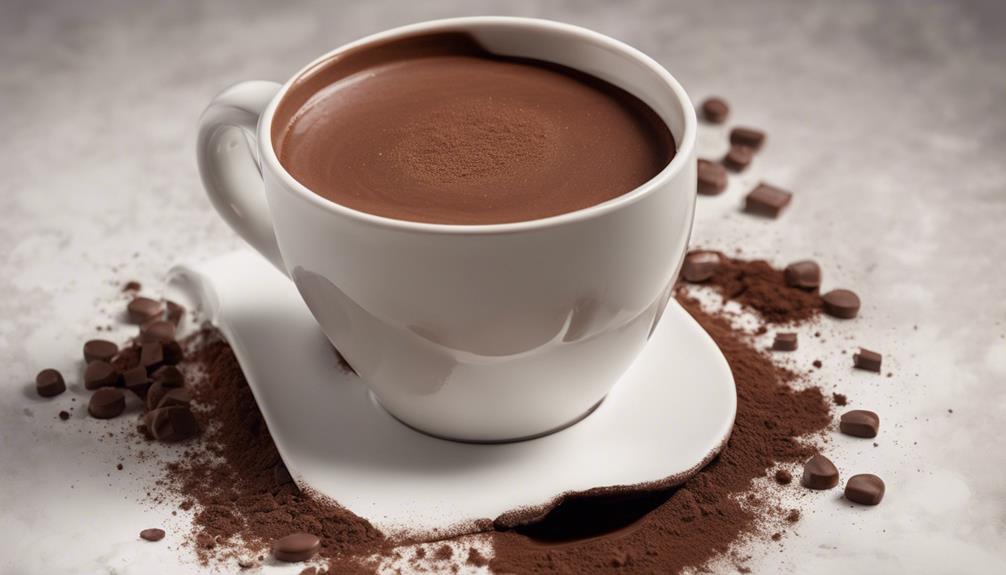
Decaffeinated cocoa powder is a popular choice for those seeking to reduce their caffeine intake without compromising on the rich flavor and health benefits of cocoa. When it comes to understanding decaffeinated cocoa powder:
- Caffeine Reduction: The decaffeination process can greatly reduce caffeine levels by around 80.1%, making it a suitable option for individuals looking to lower their caffeine consumption.
- Nutrient Retention: Despite the caffeine removal, decaffeinated cocoa powder retains essential compounds like theobromine and polyphenols, which contribute to its health benefits and antioxidant properties.
- Product Example: Brands like Supercocoa offer decaffeinated cocoa powder, ensuring that consumers have access to a flavorful and health-conscious alternative.
Decaffeinated cocoa powder is a practical solution for those sensitive to caffeine or looking to enjoy cocoa's goodness without the stimulating effects. Making this choice allows you to savor the taste and benefits of cocoa without the concerns associated with caffeine intake.
Caffeine Sensitivity and Cocoa Consumption

Considering the impact of caffeine sensitivity, it's important to acknowledge the caffeine content present in cocoa powder and its potential effects on individuals.
Cocoa powder contains caffeine, with 100g of unsweetened cocoa powder containing 230mg of caffeine. For those with caffeine sensitivity, it's vital to be aware of this when consuming cocoa products.
However, there's an option for decaffeinated cocoa powder, where the processing can reduce caffeine levels by 80.1% while still retaining essential compounds like theobromine and polyphenols. These functional components play a significant role in the health benefits associated with cocoa.
By opting for decaffeinated cocoa products, individuals can enjoy the goodness of cocoa without the stimulating effects of caffeine. It's reassuring to know that most of the caffeine can be removed from high-cocoa products while preserving these important compounds.
Cocoa Vs. Tea: Caffeine Comparison
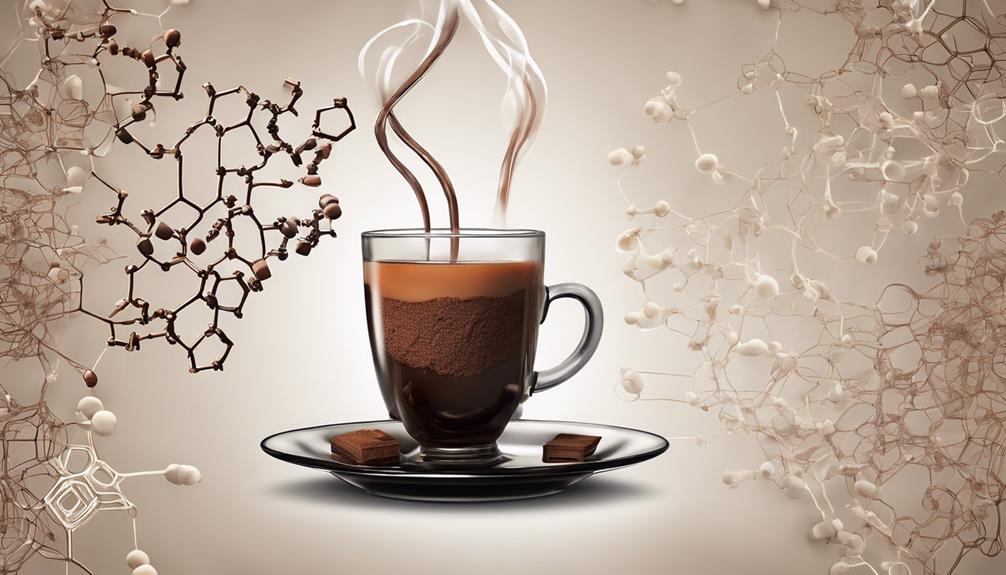
When comparing caffeine levels, cocoa powder overwhelmingly outdoes tea, with 230 mg per 100 grams compared to tea's 11 mg. If you're looking to understand how these two popular ingredients stack up regarding caffeine content, here's a breakdown:
- Cocoa Powder: With a robust 230 mg of caffeine per 100 grams, cocoa powder packs a powerful punch when it comes to this stimulant. If you're seeking a caffeine boost, cocoa powder is definitely a potent choice.
- Tea: While tea is known for its soothing properties, it falls short in the caffeine department compared to cocoa powder. Black tea, for example, typically contains around 40 mg of caffeine per 100 grams, still notably lower than cocoa powder's content.
- Packaged Teas: If you opt for packaged teas, you'll find they usually have only 8 mg of caffeine per 100 grams, making them a much lower caffeine option compared to cocoa powder.
The Role of Cocoa in Caffeine Intake
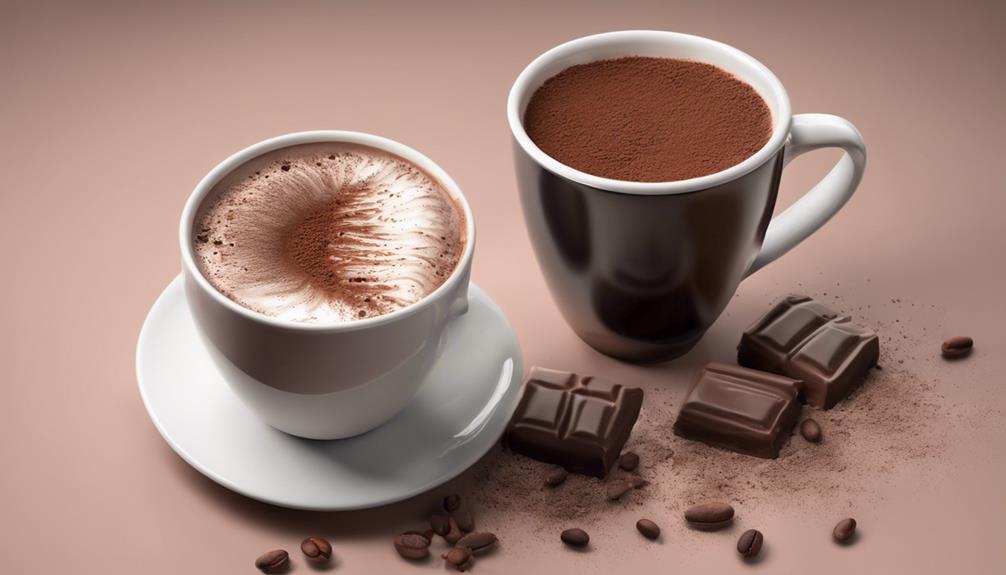
Cocoa powder is a significant contributor to one's caffeine intake, packing a powerful 230 mg of caffeine per 100 grams. For individuals sensitive to caffeine, this can be quite impactful. The caffeine content in cocoa powder can vary depending on the processing method and the type of cocoa beans used.
Opting for decaffeinated cocoa powder is an option to ponder, as it can reduce caffeine levels by 80.1% while still preserving the beneficial theobromine and polyphenols. Decaffeinated cocoa powder allows you to enjoy the health advantages of cocoa without experiencing the stimulating effects of caffeine.
If you're looking to manage your caffeine intake or are sensitive to its effects, choosing decaffeinated cocoa powder might be a suitable alternative. Remember, being mindful of the caffeine content in cocoa powder can help you make informed decisions about your dietary choices.
Managing Caffeine Intake With Cocoa

Managing my caffeine intake with cocoa involves making smart choices to balance my love for the flavor with my sensitivity to caffeine.
When it comes to enjoying cocoa while managing caffeine intake, here are some tips to keep in mind:
- Choose Decaffeinated Cocoa Powder: Opting for decaffeinated cocoa powder can greatly reduce the caffeine levels while still preserving the beneficial theobromine and polyphenols found in cocoa.
- Monitor Caffeine Sensitivity: Being mindful of your caffeine sensitivity is essential when consuming cocoa products. Decaffeinated options can be a great alternative for those who are sensitive to caffeine but still want to enjoy the health benefits of cocoa.
- Enjoy the Health Benefits: Cocoa powder is rich in antioxidants and has various health benefits such as improving heart health and mood. By selecting decaffeinated cocoa, you can reap these advantages without the stimulating effects of caffeine.
Exploring Cocoa-Caffeine Myths

Exploring popular myths surrounding the consumption of cocoa and its caffeine content reveals surprising truths about this beloved treat. Let's dive into the misconceptions and realities through an informative table:
| Myth | Fact |
|---|---|
| Cocoa powder is caffeine-free. | Cocoa powder contains caffeine, with 100g providing 230mg. |
| All cocoa powders have the same caffeine content. | Caffeine levels can vary based on processing methods and cocoa bean types. |
| Decaffeinated cocoa is less flavorful. | Decaffeinated cocoa powder can lower caffeine content by 80.1% while preserving theobromine and polyphenols. |
Understanding these myths can help us make informed choices about our cocoa consumption. Whether you prefer a jolt of caffeine or opt for a decaffeinated option, there are choices available to suit your needs and taste preferences. So, next time you reach for that cup of cocoa, remember the facts behind its caffeine content and savor the flavor without any misconceptions.
Frequently Asked Questions
Which Has More Caffeine Coffee or Cocoa Powder?
Coffee generally contains less caffeine per gram compared to cocoa powder. Cocoa powder has notably higher caffeine content. However, serving sizes differ; an 8 oz cup of coffee typically has less caffeine than 100 grams of cocoa powder.
Is There a Lot of Caffeine in Cacao?
There isn't a lot of caffeine in cacao, but it does contain some. The caffeine content varies, but it's generally lower than cocoa powder. Cacao is a natural source of caffeine, providing a subtle boost.
Does Cocoa Powder Keep You Awake?
Cocoa powder can keep me awake due to its caffeine content. Moderation is key as it may not affect sleep patterns to a large extent. Factors like sensitivity and quantity consumed influence its impact on staying awake, offering a milder stimulation than coffee.
Does Hershey's Unsweetened Cocoa Powder Have Caffeine?
Hmm, Hershey's Unsweetened Cocoa Powder has 12 mg of caffeine per tablespoon. It's lower than sweetened cocoa powder. Great for recipes without adding much caffeine. Dutching process cuts caffeine by two-thirds. A good choice for limiting caffeine.
Is Consuming Cocoa Powder a Source of Caffeine Intake?
Yes, consuming cocoa powder can contribute to your caffeine intake, as it contains a moderate amount of caffeine. However, the exact caffeine content in cocoa powder can vary depending on the brand and processing method. It’s always best to check the label for specific information on caffeine content.
Conclusion
To sum up, cocoa powder does contain caffeine, but in lower amounts compared to coffee. So, while it may not give you the same jolt of energy, it's still important to be mindful of your caffeine intake.
Just like balancing flavors in a recipe, finding the right balance of cocoa and caffeine can help you enjoy your favorite treats without going overboard.
So, savor your cocoa creations with care and moderation for a balanced and enjoyable experience.

